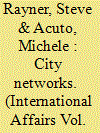|
|
|
Sort Order |
|
|
|
Items / Page
|
|
|
|
|
|
|
| Srl | Item |
| 1 |
ID:
148458


|
|
|
|
|
| Summary/Abstract |
There is today a global recognition that we live in an ‘urban age’ of near-planetary urbanization where cities are at the forefront of all sorts of agendas. Yet little attention is offered to the active role of cities as political drivers of the urban age. There might today be more than two hundred ‘city networks’ globally, with thousands of para-diplomatic connections actively defining relations between cities, international organization and corporate actors. This actively networked texture of the urban age shapes all areas of policy and, not least, international relations, and holds much promise as to possible urban solutions to global challenges. Based on an overview of a representative subset of this mass of city-to-city cooperation (n=170), this article illustrates the landscape of city networking, its issue areas and institutional shapes, and its critical features. As we argue, city networks today are faced by a crucial challenge: while trying to overcome state-centric ‘gridlocks’ cities are, at the same time, building both political–economic as well as very material ‘lock-ins’. We need to pay serious attention to this impact of city diplomacy in international affairs, developing a greater appreciation of the path dependencies and responsibilities this diplomatic activity purports.
|
|
|
|
|
|
|
|
|
|
|
|
|
|
|
|
| 2 |
ID:
096075


|
|
|
|
|
| Publication |
2010.
|
| Summary/Abstract |
The author looks at diverse concepts and roles of trust in the challenge of decarbonising energy systems, drawing on 25 years of personal experience in the fields of energy and environmental policy research. The paper focuses on three issues-public trust in science, institutional trust in making technology choices, and the idea that high-trust societies are more sustainable than those exhibiting low-trust. While trust is a key concept in understanding the public acceptability of technology choices, it is only one of a suite of interrelated concepts that must be addressed, which also includes liability, consent, and fairness. Furthermore, rational distrust among competing institutional world views may be critical in understanding the role of social capital in socioeconomic and technological development. Thus the concept of trust has become a portmanteau, carrying a diverse range of ideas and conditions for sustainable energy systems. The paper concludes with three emphases for decision makers. First, the issue is the energy system, not particular generating technologies. Second, the energy system must be recognized to be as much a social system as it is a technical one. Third, the system requires incorporation of the minimum level of diversity of engineering technologies and social actors to be sustainable.
|
|
|
|
|
|
|
|
|
|
|
|
|
|
|
|
|
|
|
|
|